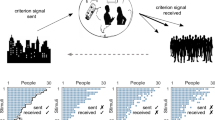Abstract
This study examined possible sex and age differences in children's perceptions of the attractiveness of unobtainable and obtained objects. Using an experimental paradigm developed by Hammock and J. Brehm (1966), half of the male and female first-grade and sixth-grade subjects were led to expect to choose between two objects; the other half were told they would be given one of two objects, but were not led to expect to choose between these objects. After subjects ranked an array of 10 objects, all subjects were given their third-ranked object and denied their fourth-ranked object. No subject was given any opportunity to indicate a preference or make a choice between these two alternatives. As predicted, subjects' subsequent rankings of the objects differed according to sex. Male subjects behaved in accordance with theoretical predictions based on J. Brehm's theory of psychological reactance and, thus, replicated the results obtained by Hammock and Brehm. The behavior of female subjects did not conform to the reactance theory model. No age differences were predicted and none were obtained. The implications of these results for predicting whether an unobtainable object will become more or less attractive, and for the nature and extent of sex differences in children's responses to the loss of behavioral freedoms, are discussed.
Similar content being viewed by others
References
Allen, V., & Allen, P. On the attractiveness of forbidden objects. Developmental Psychology, 1974, 10, 871–873.
Bar-Tal, D., & Frieze, I. H. Achievement motivation for males and females as a determinant of attributions for success and failure. Sex Roles, 1977, 3, 301–313.
Bem, D. J. Self-perception theory. In L. Berkowitz (Ed.), Advances in experimental social psychology (Vol. 6). New York: Academic Press, 1972.
Benton, A. A., Gelber, E. R., Kelley, H. H., & Leibling, B. A. Reactions to various degrees of deceit in a mixed-motive relationship. Journal of Personality and Social Psychology, 1969, 12, 170–180.
Brannigan, G. G., & Tolor, A. Sex differences in adaptive styles. Journal of Genetic Psychology, 1971, 119, 143–149.
Brehm, J. W. A theory of psychological reactance. New York: Academic Press, 1966.
Brehm, J. W., & Cole, A. Effect of a favor which reduces freedom. Journal of Personality and Social Psychology, 1966, 3, 420–426.
Brehm, J. W., & Rozen, E. Attractiveness of old alternatives when a new, attractive alternative is introduced. Journal of Personality and Social Psychology, 1971, 20, 261–266.
Brehm, S. S. The effect of adult influence on children's preferences: Compliance versus opposition. Journal of Abnormal Child Psychology, 1977, 5, 31–41.
Brehm, S. S., & Weinraub, M. Physical barriers and psychological reactance: 2-year-olds' responses to threats to freedom. Journal of Personality and Social Psychology, 1977, 35, 830–836.
Deaux, K., & Emswiller, T. Explanations for successful performance on sex-linked tasks: What's skill for the male is luck for the female. Journal of Personality and Social Psychology, 1974, 29, 80–85.
Feather, N. T. Attribution of responsibility and valence of success and failure in relation to initial confidence and task performance. Journal of Personality and Social Psychology, 1969, 13, 129–144.
Feshbach, S. Aggression. In P. H. Mussen (Ed.). Carmichael's manual of child psychology. New York: Wiley, 1970.
Goldman, M., & Wallis, D. Restoring freedom when pressured not to select alternatives. Psychological Reports, 1979, 44, 563–566.
Hammock, T., & Brehm, J. W. The attractiveness of choice alternatives when freedom to choose is eliminated by a social agent. Journal of Personality, 1966, 34, 546–554.
Knott, P. D., Nunnally, J. C., & Duchnowski, A. J. Effects of frustration on primary and conditioned incentive value. Journal of Experimental Research in Personality, 1967, 2, 140–149.
Linder, D. E., & Crane, K. A. Reactance theory analysis of predecisional cognitive processes. Journal of Personality and Social Psychology, 1970, 15, 258–264.
Maccoby, E. E., & Jacklin, C. N. The psychology of sex differences. Stanford: Stanford University Press, 1974.
Regan, J. W., & Brehm, J. W. Compliance in buying as a function of inducements that threaten freedom. In L. Bickman & T. Henchy (Eds.), Beyond the laboratory: Field research in social psychology. New York: McGraw-Hill, 1972.
Sistrunk, F., & McDavid, J. W. Sex variable in conforming behavior. Journal of Personality and Social Psychology, 1971, 17, 200–207.
Stein, A. H., & Bailey, M. M. The socialization of achievement orientation in females. Psychological Bulletin, 1973, 80, 345–366.
Sullivan, J. J., & Pallak, M. S. The effect of commitment and reactance on action-taking. Personality and Social Psychology Bulletin, 1976, 2, 179–182.
Wicklund, R. A. Freedom and reactance. Hillsdale, N.J.: Erlbaum, 1974.
Wicklund, R. A., & Brehm, J. W. Attitude change as a function of felt competence and threat to attitudinal freedom. Journal of Experimental Social Psychology, 1968, 4, 64–75.
Wicklund, R. A., & Brehm, J. W. Perspectives on cognitive dissonance. Hillsdale, N.J.: Erlbaum, 1976.
Worchel, S., & Andreoli, V. A. Attribution of causality as a means of restoring behavioral freedom. Journal of Personality and Social Psychology, 1974, 29, 237–245.
Author information
Authors and Affiliations
Additional information
This research was supported in part by a grant from the General Research Fund of the University of Kansas. Thanks are due to Bette Mayhugh, Thomas Kelley, Deborah Holt, and Robert Britain for serving as experimenters; to the staff and students of Yates Center and Conn West Elementary schools for assisting with and participating in this research; to Ed Morrow for building the step-construction; and to Jeanne Neath for her comments on the manuscript. Correspondence should be sent to Sharon S. Brehm, Department of Psychology, University of Kansas, Lawrence, Kansas 66045.
Rights and permissions
About this article
Cite this article
Brehm, S.S. Psychological reactance and the attractiveness of unobtainable objects: Sex differences in children's responses to an elimination of freedom. Sex Roles 7, 937–949 (1981). https://doi.org/10.1007/BF00290976
Issue Date:
DOI: https://doi.org/10.1007/BF00290976




